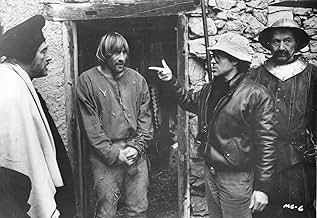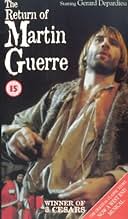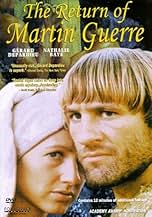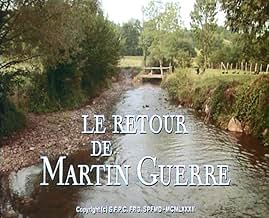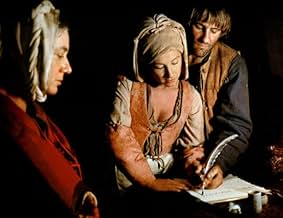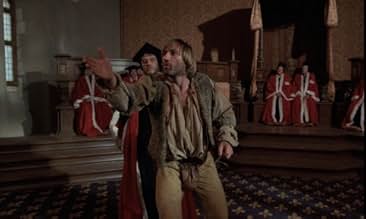Le retour de Martin Guerre
- 1982
- Tous publics
- 1h 52min
NOTE IMDb
7,4/10
5 k
MA NOTE
Dans la France médiévale, certains villageois contestent la revendication d'identité d'un homme lorsqu'il (comme il dit) rentre chez lui après avoir passé un certain temps dans l'armée.Dans la France médiévale, certains villageois contestent la revendication d'identité d'un homme lorsqu'il (comme il dit) rentre chez lui après avoir passé un certain temps dans l'armée.Dans la France médiévale, certains villageois contestent la revendication d'identité d'un homme lorsqu'il (comme il dit) rentre chez lui après avoir passé un certain temps dans l'armée.
- Réalisation
- Scénario
- Casting principal
- Nommé pour 1 Oscar
- 6 victoires et 5 nominations au total
Avis à la une
This isn't a comment on the actual quality of the movie itself, but rather a response to the number of postings which have suggested this movie is not an original concept.
I have some shocking news for you, but there really was a Martin Guerre. His court case in the mid-16th century is well documented in primary sources and this movie attempts to retell this story.
In 1983, historian Natalie Zemon Davis, who incidentally was originally involved with the film as an historical consultant, wrote a well received micro-history on the court case and it's outcome. (The Return of Martin Guerre - published by Harvard University Press, 1983)
This case was thought of as unusual even during the 16th century. So much so, that it became part of French folklore. Earlier Hollywood movies likely tapped into this folklore, when they penned similar stories.
So this film, rather than simply being another in a long line of similar movies, is the first to tackle the "original story". That being said, the movie is not perfect and strays from the facts a great deal. Natalie Zemon Davis, herself, states in her introduction to her book that she was troubled by the film's creative license with history.
Nevertheless, I recommend anyone to see this film yourself and make up your own mind. Better yet, read the book!
I have some shocking news for you, but there really was a Martin Guerre. His court case in the mid-16th century is well documented in primary sources and this movie attempts to retell this story.
In 1983, historian Natalie Zemon Davis, who incidentally was originally involved with the film as an historical consultant, wrote a well received micro-history on the court case and it's outcome. (The Return of Martin Guerre - published by Harvard University Press, 1983)
This case was thought of as unusual even during the 16th century. So much so, that it became part of French folklore. Earlier Hollywood movies likely tapped into this folklore, when they penned similar stories.
So this film, rather than simply being another in a long line of similar movies, is the first to tackle the "original story". That being said, the movie is not perfect and strays from the facts a great deal. Natalie Zemon Davis, herself, states in her introduction to her book that she was troubled by the film's creative license with history.
Nevertheless, I recommend anyone to see this film yourself and make up your own mind. Better yet, read the book!
This is one of my most favorite movies of all time.
What makes this film so good? It is basically about this one universal truth, as said succinctly and poignantly by Bertrand, the wife of Martin Guerre: "As a woman, I have needs." Societies and civilisations that ignore this fact are the worse off for it.
Good acting, historical, and based on real events - these are some of the other positive aspects of the film.
What makes this film so good? It is basically about this one universal truth, as said succinctly and poignantly by Bertrand, the wife of Martin Guerre: "As a woman, I have needs." Societies and civilisations that ignore this fact are the worse off for it.
Good acting, historical, and based on real events - these are some of the other positive aspects of the film.
After about thirteen or fourteen years I finally was able to see this film again, this time in French with subtitles, not dubbed into German. There was nothing wrong with the German version, the film certainly didn't fail to impress me so much, that I declared this film to be the best Gérard Depardieu has ever done. I think I still have the same opinion, although meanwhile it ties with Les Misérables.
Now today I watched it again. I couldn't remember anything really, just parts of scenes and what happened at the end, of course. But then everything came back. The music suddenly seemed familiar, the village, the faces. I still was surprised to see Tcheky Karyo's name in the credits at the end, because I missed him completely, while I recognized Dominique Pinon at once, much younger of course. Again I stood in awe of the costumes and the village scenery. Everything was so convincing and realistic. As if someone had done a time travel and brought back a video. After The Name of the Rose this is the best period film till now. In the art department. But also certainly in acting, writing and directing.
Gérard Depardieu and Nathalie Baye deliver performances which are outstanding. Every acting student should watch them, they are masters of their profession. They show emotions which are almost palpable, you feel with them, certainly towards the end, but also during the rest of the time. The script offered them "only" great parts and they created lives out of the printed words. Every gesture, every movement, every look fits and connects the viewer with the story. As if you're in the story, not watching it. There is no doubt whatsoever that this story is real. Even if history should have been a bit different (which I don't know), the story in the film feels real.
And I just want to add that everyone who calls M. Depardieu ugly or anything like it, is not only extremely rude but obviously not receptive to any kind of charisma and aura. With actors (as with people in general, right?) looks are not important. Whoever thinks that, should switch from watching films to watching models. There he can get empty beauty.
My recommendation is: watch this film. You can hardly spend an evening in a better way. 10 out of 10.
Now today I watched it again. I couldn't remember anything really, just parts of scenes and what happened at the end, of course. But then everything came back. The music suddenly seemed familiar, the village, the faces. I still was surprised to see Tcheky Karyo's name in the credits at the end, because I missed him completely, while I recognized Dominique Pinon at once, much younger of course. Again I stood in awe of the costumes and the village scenery. Everything was so convincing and realistic. As if someone had done a time travel and brought back a video. After The Name of the Rose this is the best period film till now. In the art department. But also certainly in acting, writing and directing.
Gérard Depardieu and Nathalie Baye deliver performances which are outstanding. Every acting student should watch them, they are masters of their profession. They show emotions which are almost palpable, you feel with them, certainly towards the end, but also during the rest of the time. The script offered them "only" great parts and they created lives out of the printed words. Every gesture, every movement, every look fits and connects the viewer with the story. As if you're in the story, not watching it. There is no doubt whatsoever that this story is real. Even if history should have been a bit different (which I don't know), the story in the film feels real.
And I just want to add that everyone who calls M. Depardieu ugly or anything like it, is not only extremely rude but obviously not receptive to any kind of charisma and aura. With actors (as with people in general, right?) looks are not important. Whoever thinks that, should switch from watching films to watching models. There he can get empty beauty.
My recommendation is: watch this film. You can hardly spend an evening in a better way. 10 out of 10.
The one thing that THE RETURN OF MARTIN GUERRE serves to do is prove positively and absolutely that not all the great film productions come from the USA.
This is an extremely well made movie, with extremely high production values. Great acting, great sets, great costumes, great score. Pure quality.
This is an extremely well made movie, with extremely high production values. Great acting, great sets, great costumes, great score. Pure quality.
This is the true story of a peasant in 16th century France who left his home village for almost a decade without saying a word to anyone, even his long suffering wife. When he comes home he's different; he's better. He's sweeter, more helpful, he smiles, hell - he laughs. Martin was never so good. Then comes the day a couple of drifters hit the village. They claim to know Martin but by a different name. That was the first chink in the armor. Things become so uncertain that he is finally put on trial to ascertain who this guy is. This is a loving microhistory intimately telling the story of life on a southern French farm after the wars of religion. It is superbly directed and acted, especially by the two leads, Gérard Depardieu and Nathalie Baye.
Le saviez-vous
- AnecdotesBased on a true story.
- ConnexionsFeatured in Les cent et une nuits de Simon Cinéma (1995)
Meilleurs choix
Connectez-vous pour évaluer et suivre la liste de favoris afin de recevoir des recommandations personnalisées
Détails
- Date de sortie
- Pays d’origine
- Langue
- Aussi connu sous le nom de
- The Return of Martin Guerre
- Lieux de tournage
- Sociétés de production
- Voir plus de crédits d'entreprise sur IMDbPro
Box-office
- Montant brut aux États-Unis et au Canada
- 3 723 036 $US
- Week-end de sortie aux États-Unis et au Canada
- 8 682 $US
- 7 juil. 2019
- Montant brut mondial
- 3 723 036 $US
Contribuer à cette page
Suggérer une modification ou ajouter du contenu manquant

Lacune principale
By what name was Le retour de Martin Guerre (1982) officially released in India in English?
Répondre

